The COVID-19 pandemic brought the phrase “new normal” into the everyday lexicon, but for one Iowa farmer, her new normal looks completely different than it does for the rest of us.
Diagnosed with an arteriovenous malformation, which is an abnormal tangle of blood vessels both inside and on her spinal cord, the now-27-year-old Karen Fitch had been told in September of 2019 that her prognosis was looking good and that doctors wouldn’t need to see her again for another five years.
Only a few weeks later, in November, Karen had a sudden onset of paralysis.
What had been a relatively normal life suddenly felt physically entrapping, burdened by long stretches of fear, anxiety, and uncertainty. Karen saw doctors and specialists across multiple states, and her stays in hospitals and rehab facilities were marked more notably by setbacks than they were by progress.
“We had thought things were fine” after that September prognosis, Karen said. “We were riding the high from that. And then about six weeks later, I woke up in the middle of the night and didn’t feel quite right. Within five minutes, I couldn’t move or feel anything from the neck down.”
Over the next several months, Karen had to fight for her life as doctors struggled to make sense of the complex medical issues that were happening. Karen’s malformation affects the area between the C2 and C5 vertebrae, near the base of her skull and down her neck. She was diagnosed at age 6 and had surgeries at ages 7 and 8.
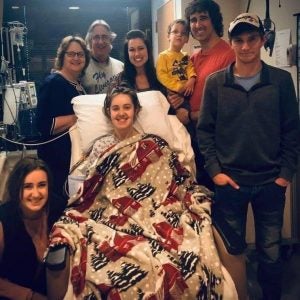
Her condition had been a specter throughout her youth, even as she tried to remain active and played on a traveling softball team, finished high school, and graduated with honors from Culver-Stockton College in Missouri.
“It was a lot to go from thinking that we wouldn’t have to worry about it for five years to, ‘Crap, this is really scary,’” she said. “It was a lot for all of us.”
Agriculture is an industry in which technology can do so much, but our bodies must be capable of shouldering day-long tasks, often difficult labor, and year-round outdoor conditions. For Karen, who now uses wheelchair and has a tracheostomy tube much of the time, her paralysis changed everything.
Karen Livesay married Nik Fitch in 2017 and purchased a 117-acre farm outside of the little town of Keosauqua, in the southeast part of Iowa very near the border with Missouri. The couple bought their farm, moved, and got married all in the same month — a noticeable foreshadowing of the skills they would summon to manage so many moving parts of Karen’s health and treatment.
They live in a 1950s-era ranch-style home about 1.5 miles from where Karen’s family farm is, and Nik grew up farming about 30 minutes away.
“My grandpa always used to say that we were 35 miles to nowhere,” Karen says with a smile.
While much of their property is in the Conservation Reserve Program, Karen and Nik spent the first couple years of their marriage with cows, while also growing hay and enough corn to make their own feed. Their long-term goal, once the land is out of CRP, is to add fencing and restore it to a working family farm.
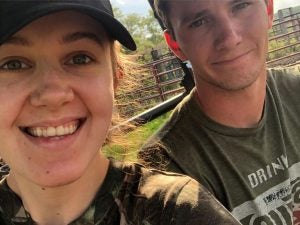
In addition to the farm, the couple and their family have an agronomy sales and service business, A Better Way to Farm, which has provided for a large chunk of their financial needs. Even though insurance through self-employment is particularly expensive, Karen’s condition has meant that it was never an option not to be insured — something that became ever more vital as Karen’s health teetered precipitously over the past two years.
Karen describes going to bed Nov. 8, 2019, and waking up the next day in a way that suggests she’s told the story a thousand times by now.
She was taken to her local hospital and then helicoptered to the University of Iowa Hospital for surgery. Initially, everything seemed to go well, and she was standing and pivoting. But around Thanksgiving, a couple of days after being transferred to a rehab hospital, a bleed in her spinal column was discovered, and she went back to the UI hospital in Iowa City for another surgery.
“That’s kind of when the luck ran out, for lack of better words,” she says.
Nik recalls that he didn’t have a good feeling going into that second surgery.
“I had this pit in my stomach that something might happen,” he says. “And we almost lost Karen that night.”
Medical professionals know the series of events that happened, but they don’t fully know why things went so poorly during Karen’s second surgery. After a stent was put in an artery, she struggled trying to swallow a pill flat on her back.
“I aspirated,” she explains. “They put me on a BiPap machine, and it blew a hole in one of my lungs. And they started to fill with blood, so I ended up with five chest tubes.”
The University of Iowa Hospital is the biggest hospital in the state, but doctors there weren’t expecting the wave of complications that Karen presented with.
“They came to Nik and my family and said, ‘We have a plan for if any one, or maybe even two, of these things went wrong, but we’ve never seen all three things that happened with her lungs go wrong at the same time,’” Karen says.
Because of that, treatment continued in Iowa through January 2020, when she was transferred to a rehab hospital and then to another acute care hospital. Her lungs were significantly worse than anyone had realized.
The goal at that point wasn’t for Karen to move again, it was simply to get her off the ventilator.
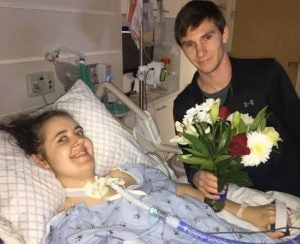
Yet other problems also emerged, including one attempt at sedation that had a counter-effect, which kept Karen awake for the bulk of almost eight days. Because she was intubated, she used a board with letters and a blinking system to communicate with others.
“I remember telling my mom, ‘If I sleep, I’m afraid I will die. I have to stay awake,’” she says.
Throughout these hospital stays, one of Karen’s friends from high school, along with some neighbors and others, stepped in to help around the farm. As Karen’s family poured time and money into hotels, food, laundry services, and even parking, there were assurances from these helpers that calving season was covered and that the animals had enough hay each week.
“We’re very fortunate that so many people were willing to help,” she said. “I think that’s one of the great things about living in a small community. People really step up when someone is in need.”
Karen ended up at Shirley Ryan AbilityLab in Chicago in spring 2020. At that time, things for her were finally starting to turn around — just as a burgeoning pandemic was debilitating the world around her.
The COVID-19 pandemic upended life inside and outside of hospitals.
Family who used to be in her recovery room 24 hours a day, seven days a week, were limited to just one person at a time (her mom and Nik rotated that role). But the doctor knew, with Karen’s lungs in the weakened state that they were in, she was particularly susceptible to catching COVID and being severely impacted by it.
The doctor said, “‘You live in the middle of nowhere. I want you to go home, do nothing, and see no one until this evens back out,” Karen recalls.
It was scary at first — both Karen and Nik come from farming families with no medical background. Karen’s mom, for example, was a history teacher.
But things have improved being at home, under the care of loved ones. The resilience that has seen Karen through so much has propelled her progress. Coming out of her latest surgery, all she could do was lift her left hand; today, she has good use of her left arm and hand, as well as having some movement in her right arm and toes.
“No one has a clear idea of what that means or what the prognosis is, but we’re hopeful,” she says, though it does suggest that there are at least some nerve signals going to the lowest parts of her spine. She has been on calls with specialists from the Mayo Clinic and Stanford University in recent months.
“For the most part, things have gone really well since we’ve been back home in Iowa,” Karen says. “It’s one of those things where you feel like you’re drowning, and then you wake up a year later, and it hits you, and you’re like, ‘Oh, I think we’ve got it.’”
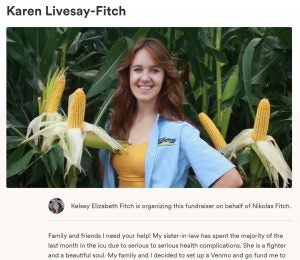
Her local community and other supporters stepped up again when a GoFundMe page was created to help cover some costs, such as the need for a handicapped-accessible van.
“We now have an idea of what it takes to help Karen,” Nik says.
Perhaps more than anything, Karen was happy to be doing her recovery in the comforts of home, surrounded by her animals and the farm. And instead of fighting back only against her condition, she wanted to channel her energy into something else positive that could have a larger impact on spinal cord research nationwide.
Together, Karen and Nik created the Cuddle Cow Company.
“We’ve been getting our butts kicked for so long that we’d like to kick some butt back,” Nik says with defiant enthusiasm.
The Cuddle Cow Company sells blankets with photos of the very cows that Karen has worked so hard to come home to.
“When I was in the hospital, so many people had no idea what farm life was like or even what a cow was,” Karen says. “Some people didn’t know there were any cows except dairy cows. One nurse thought the picture I had in my room was of a buffalo! I realized these people had missed out on experiencing a calf sucking on their finger or watching the momma cows come running when my nieces and nephews call them to the feed bunk. By sharing our cows with the world, we can give people a glimpse of what it’s like to be close to some pretty amazing creatures!”
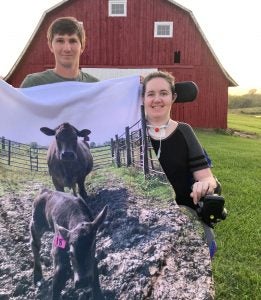
Part of the proceeds from the Cuddle Cow Company are going to Northwestern University, where an injectable therapy is being developed that may be able to reverse paralysis and repair tissue after severe spinal cord injuries.
Nik has also explored other options for helping his wife, including stem cell treatments and sensor-driven wearable robotics.
“There’s a lot of things happening in the world to help people with spinal cord injuries. It’s a slow process, and it’s hard to get people who have these injuries where they need to be so they can get help,” Nik says. “But we have a plan to help Karen.”
Karen’s medical file doesn’t tell the full story of where she is today — doctors repeatedly comment that she is progressing far better than her charts suggest.
“I believe in my wife,” Nik says. “I believe in us, that we could turn this around and get our life back on track.”
Karen’s arc is far from over, but she understands that no one is promised an easy life, only that there will be people to guide us through our challenges.
“It’s not so much ‘why me,’ it’s more ‘why not me.’ There’s nothing special about me,” Karen says. “If God didn’t want me here still, if I wasn’t supposed to be here for a purpose, I wouldn’t be.”
Ryan Tipps is the founder and managing editor of AGDAILY. The Indiana native has a master’s degree in Agriculture and Life Sciences from Virginia Tech and has covered the food and farming industries at the state and national levels since 2011.



